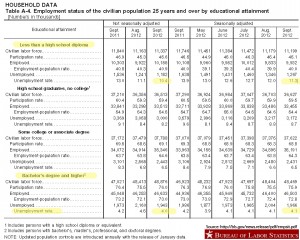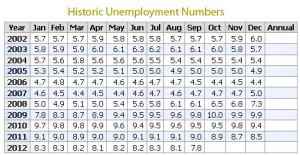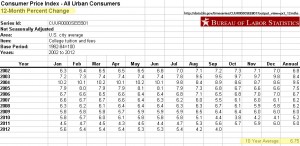The Education Difference
Finding Employment
 There are many factors that impact your ability to find employment. Everything from your field of work to your location will have some effect on your job search and how successful it will be. For example, if you are in Illinois, which has an unemployment rate of 8.8%*, you will have to compete with a higher number of people than you would if you lived in Wisconsin with an unemployment rate of 7.3%*.
There are many factors that impact your ability to find employment. Everything from your field of work to your location will have some effect on your job search and how successful it will be. For example, if you are in Illinois, which has an unemployment rate of 8.8%*, you will have to compete with a higher number of people than you would if you lived in Wisconsin with an unemployment rate of 7.3%*.
While you don’t necessarily have the ability to get up and move at a moments notice, there is another area of your life that you can change that will make an impact on your employability. Your education.
Education and Unemployment
If you take a look at the statistics from the Bureau of Labor Statistics image above, it becomes clear that the higher your education level, the better chance you have to remain employed. Compare, for example, the seasonally adjusted unemployment rate of a person who did not finish high school (11.3%) to the unemployment rate of a person who did finish high school (8.7%). There is a difference of 2.6% just for finishing high school.

Now compare the unemployment percentage of those that have a Bachelors degree or higher (4.1%) to the lowest unemployment numbers for the last 10 years (4.4%). That tells you that with a Bachelors degree or better you have a relatively high chance of keeping your job or being able to find a new one relatively quickly.
What to do?
Given the gaps in unemployment rates by education, if you do not have a Bachelors degree, you will become more employable by increasing your education level. If you do not yet have your high school diploma, find the GED Testing centers near you and find out what the requirements and costs are to complete your GED.
A Bachelors degree may not be readily attainable in the time frame you have available to you. If this is the case, you can take bite sized chunks out of it by completing individual classes, certifications, your Associates degree and then finish with your Bachelors degree. Go for your quickest attainable milestone if time is of the essence. The most important thing is that you take action now, not later.
What About the Costs?
One of the biggest hurdles to getting higher education is the cost. College tuition has increased an average of 6.75% each year over the last 10 years (See the chart above). One way to combat these rising costs is to take as many classes as you can at your local community college and transfer the credits over to a 4 year college when you are ready to finish up your Bachelors degree.
Creating a budget will help you to determine how much additional money you will need to pursue your degree. If you have a budget deficit and need additional money for college, talk to the people at IDES (or your local Department of Employment Services) for more information on receiving grants to finish school.
Another option that may be available to you is to apply for help under the Trade Adjustment Act (TAA). The Department of Labor Employment & Training Administration has a nice brochure explaining what the TAA is. You should also be able to get information and apply at the IDES office. When I was laid off in 2001, I took advantage of the TAA and it was of tremendous value. Without their assistance I would not have been able to complete my Bachelors degree.
Unemployment Gap Discrimination
If you do go back to school for any length of time, you may find that employers are hesitant to employ you simply because you have been out of work for so long. There are many ways to try and deal with this issue. One way I have not seen discussed very often is starting your own business.
I’ve talked about starting your own website previously in the Personal Branding article. Before you create a website and start an LLC or S Corp, be aware of the unemployment insurance implications. Talk to your unemployment office before jumping in and starting a business. You may end up becoming ineligible for future and current unemployment benefits by starting your own LLC or S Corp.
If you’ve already run out of unemployment benefits or you’re just ready to give it a try anyway, read on.
The cost of running a website is relatively inexpensive. A domain name should cost about $15 per year and hosting can be purchased for as little as $3.96 per month. If you buy a Hostgator domain name and hosting account through the links on FindIllinoisJobs.com, I will earn an affiliate commission and it will help support this website. I also highly recommend them. I run this website and several other websites on Hostgator’s shared hosting servers and I have yet to run into any issues with them.
If you choose to start a website and have little experience with running a website, there is a fantastic e-book called WP Starter Guide by Lisa Irby that does a great job helping people just starting out with WordPress Websites. Purchasing WP Starter Guide through the links on FindIllinoisJobs.com also helps support this site. I have personally bought this book and know from experience that it can help people who are just starting out with WordPress.
There are a lot of websites that can help you run a successful website so I’m going to give you the short version what you need to do.
- Purchase a domain name and hosting account.
- Write tons of high quality articles about your area of expertise.
- Join affiliate programs and promote their products through banners and links.
- Form an LLC / S-Corp.
- Use this business as your current employment on your resume.
You do not want to lie about anything on your resume. So make sure it is clear that you own the business. Your intent is not to deceive. Your intent is to show that you are still active in the workforce and to demonstrate your ability.
One of the purposes of starting your own web business is to address your employment gap. How you address questions related to the formation of the business and your reasons for returning to the workforce is important. Here is an example of a possible interview question and response:
Interviewer: I see that you have your own business. Why is it that you have decided to come back to the workforce instead of continuing your business?
You: When I started working toward finishing my Bachelors degree three years ago, I decided to start a website to practice what I was learning and put the knowledge to use in a real work environment. My initial intent was to do this for myself as a way to keep active in my field and keep what I learned fresh in my mind. After a while I noticed that other people were finding the website helpful and were willing to pay for additional help. So I decided to form an LLC to help offset the costs of running the website and I had hopes of earning a full time living through it. While I have been successful, I believe this business model has plateaued for me. I decided to return to the workforce because I prefer the stability of a 9 to 5 job over the uncertain nature of running my own business.
How you address the interviewers question is going to depend entirely on your situation, of course.
Whether or not you decide to start your own website and business, it’s clear that attaining a higher level of education will positively affect your ability to find a job. As you achieve higher education levels, your chances of becoming unemployed and staying unemployed will decrease. While you may not be able to take four years out of the workforce to complete your four year degree, achieving one education goal at a time will steadily increase your chances of finding a job.
* – Unemployment rates for September 2012







 ';
}
?>
';
}
?>
With the increase in population there is also increase in unemployment all over the world. Most of the big nation are suffering from many problems in which unemployment is the major one. So, in todays time education is the important for getting a job. There are many online high school diploma and degree for the people who want to study further along with their job.